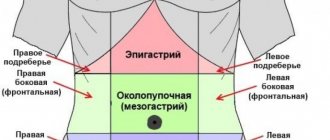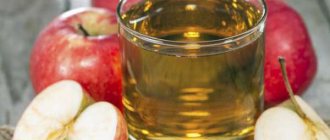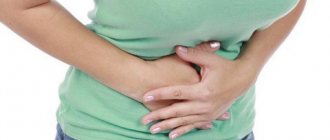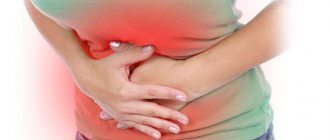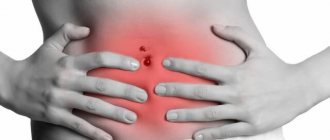What is stomach pain
Pain in the stomach area is called gastralgia.
It can be caused by many factors. These include serious pathologies of internal organs and minor temporary ailments, for example, after eating too much. Pain in the stomach is easily confused with unpleasant sensations in other organs located in the abdominal cavity and retroperitoneal space:
- small and large intestines,
- kidneys,
- appendix,
- spleen,
- gallbladder,
- liver,
- pancreas.
Often, stomach pain is accompanied by other symptoms of gastrointestinal disorders - nausea, vomiting, diarrhea.
How does my stomach hurt?
To determine that it is the stomach that hurts, you need to understand its anatomy. The stomach is located in the abdominal cavity just below the diaphragm. Its shape and size constantly change depending on the amount of food eaten. The largest part of the organ is located on the left directly under the ribs, and the smaller part is located immediately under the sternum (Fig. 1). This area is called the epigastric region.
Figure 1. Where is the stomach in the human body. Source: MedPortal
Adjacent to the posterior wall of the stomach are the pancreas, spleen and the upper part of the left kidney.
Pain in the stomach is usually localized in the upper abdomen - the epigastrium, but in the same area pain can appear with pancreatitis, cholelithiasis, and even with myocardial infarction and aortic aneurysm (Fig. 2).
Figure 2. Cause of pain depending on location. Source: MedPortal
Acute and severe “dagger” pain is characteristic of perforation of a stomach ulcer and peritonitis. In case of indigestion, the pain is localized on the left under the ribs; a sign of chronic gastritis with low acidity is pain in the middle of the abdomen; if the body of the stomach is affected, complaints are associated with painful sensations above the navel.
But the localization of pain is not an unambiguous sign of stomach diseases. For example, pain in the left side of the abdomen often occurs with osteochondrosis and cardiovascular pathologies. In women, such pain can appear due to pathologies of the ovaries and uterus.
The most likely sign of stomach problems is pain that appears after eating or during a long break between meals. But even in this case, its cause can be established only after a comprehensive examination.
Diet food
To ease the manifestation of pain in the abdomen and completely get rid of the consequences of poisoning, it is necessary to follow a dietary diet. For 2 weeks you need to eat right, adhering to the following rules:
- It is worth doing a abdominal massage, gently massaging the area between the chest and above the navel.
- You should eat in small portions, chewing everything thoroughly. Five meals a day are recommended.
- Be sure to drink plenty of fluids.
- Food should be warm, but not hot.
Do not overload the pancreas and restore the intestinal microflora - this is the goal of the prescribed diet. Therefore, it includes foods that are easy to digest.
Using the table as an example, let's look at which foods you can eat and which you should avoid if you are bothered by stomach pain after intoxication.
| Healthy foods | Cannot be consumed |
| Buckwheat and corn groats | Millet, pearl barley and barley porridge |
| Kissel, lemon balm decoction | Carbonated drinks |
| Green tea | Coffee |
| Banana and apple | Fruits other than banana and apple |
| Kefir, cottage cheese, yogurt | Fatty and salty |
| Mashed potatoes | Sweet and spicy |
| Crackers and dry bread | Baking, baking, confectionery |
| Oatmeal | Chocolate |
| Boiled meat | Sausages, smoked meats |
| Sauerkraut borscht | Canned food |
| Boiled rice | Milk |
| Boiled eggs | Butter. |
If improvements are observed and the pain stops bothering you, you can expand your diet. But prohibited foods must be introduced gradually. In this case, preference should be given to boiled and baked foods.
Why does my stomach hurt?
Stomach pain can be caused by situational reasons that do not threaten human health, and by very serious pathologies of internal organs.
Situational factors include:
- Flatulence (bloating) is a condition in which gases accumulate in the stomach, distending the organ from the inside and causing pain. The accumulation of gases is usually associated with poor nutrition and a sedentary lifestyle.
- Constipation. The causes of constipation are mainly associated with eating large amounts of fatty foods and baked goods, a lack of fresh fruits and vegetables in the diet, and physical inactivity.
- Premenstrual syndrome often causes pain that is similar in nature and location to stomach pain.
- Irritable bowel syndrome and other functional disorders of the digestive tract.
- Sprains during pregnancy.
Pain caused by situational factors is temporary and goes away fairly quickly without the help of a doctor or taking medications. Prolonged pain is a signal indicating serious health problems.
Diseases that cause stomach pain:
- Gastritis is an acute or chronic inflammation of the gastric mucosa, the most common cause of pain. The disease is most often caused by the bacterium Helicobacter pylori. Exacerbation of pathology and severe pain in the stomach can be associated with improper eating behavior, nervous strain, and taking certain medications.
- Stomach and duodenal ulcers occur against the background of chronic gastritis, problems with blood supply to the gastric mucosa and some other diseases. The ulcer manifests itself as pain in the stomach during long breaks between meals and at night (hunger pain).
- Pancreatitis is inflammation of the pancreas. Pancreatic juice secreted by the gland neutralizes hydrochloric acid. If there is insufficient juice production, the acid irritates the gastric mucosa, causing pain.
- Crohn's disease is a chronic inflammatory process in all parts of the intestine.
- Cholecystitis is inflammation of the gallbladder. Disturbance in the process of bile outflow is one of the causes of inflammation of the gastric mucosa and pain.
- Damage to the gastric mucosa by the bacterium Helicobacter pylori and other types of pathogenic microflora. Gastritis and stomach ulcers often develop as a result of infectious diseases of the digestive system.
- Stomach tumors of any etiology. Severe pain is one of the symptoms of stomach cancer, but it can also be caused by benign formations - polyps, lipomas, neuromas and others.
Pain can also be caused by diseases not related to the stomach itself: acute appendicitis, colitis, spasm of the diaphragm, thrombosis of intestinal vessels, coronary heart disease and others (Fig. 3).
Figure 3. Causes of pain in the upper and lower abdomen. GERD is gastroesophageal reflux disease. Source: verywellhealth.com
Stomach pain in women
Women often experience stomach pain during pregnancy for various reasons.
Firstly, due to an increase in progesterone levels, the intestinal muscles relax, and the time it takes for food to pass through it increases, which leads to flatulence. Secondly, the uterus, increasing in size, puts pressure on the digestive organs, slowing down the process of food digestion. During pregnancy, stomach pain can also be associated with constipation, the causes of which are hormonal fluctuations, insufficient physical activity, nervous tension, and dietary habits.
Acute pain in the stomach in women can be a signal to immediately call an ambulance, as its cause can be an ectopic pregnancy, preeclampsia, miscarriage and placental abruption.
Medical nutrition
Quite often, after poisoning, people complain that their stomach hurts very much, and they do not know what to do in such situations. Why does your stomach hurt after poisoning and what to do about it? The answer is obvious. This is due to the fact that during the period of the disease, significant damage to the patient’s gastric mucosa occurs. The cells that are responsible for the production of gastric juice/mucus should be restored completely.
For a certain period of time, a decrease in acidity occurs, and gastritis may develop. However, most often, the stomach hurts after poisoning because “irritable stomach syndrome” develops.
In order for you to stop having a stomach ache after poisoning, you need to take certain preventive measures, as well as follow a diet. The quality of food has a huge impact on the recovery process of the digestive system. For fourteen days, you must follow a healthy diet so that you will no longer be bothered by a painful stomach after an illness.
- You can massage your abdomen with light, massaging strokes.
- You can eat often, but in small portions, chewing thoroughly. Doctors recommend five meals a day, and portions should be no more than three hundred milliliters.
- Having plenty of nutritious fluids after suffering an illness is a mandatory and integral factor in recovery.
Fast Digesting Foods
In order to completely restore the functioning and activity of the gastrointestinal tract, and the stomach stops hurting, you must make its work easier and delight it with light foods that are quickly digested, for example:
- buckwheat, corn grits cooked in water;
- lean boiled meat: rabbit, chicken, young veal;
- steamed cutlets, meatballs made from minced chicken;
- fresh kefir, cottage cheese, yogurt without dyes;
- potato/vegetable/fruit puree (banana, apple) without additional fat;
- crackers, dry bread;
- Fresh borscht cooked with sauerkraut will be very useful;
- healthy liquids - green tea, lemon balm and raspberry decoction, jelly.
The temperature of the food consumed should be warm, hot is prohibited.
Prohibited Products
It is strictly forbidden to eat foods that can aggravate the recovery process and cause a relapse, namely:
- carbonated drinks, coffee;
- whole milk;
- raw vegetables, berries, fruits;
- fatty, hot, spicy, salty, sweet;
- baked goods, muffins, confectionery products, chocolate, honey, chewing gum, etc.;
- sausages, smoked meats, various preserves;
- millet, pearl barley, barley porridge.
During the recovery period, I recommend refraining from drinking alcoholic beverages and tobacco products. Since they have a destructive effect on a healthy body, not to mention a weakened and sick one. If you follow a diet and physical therapy, you will no longer be bothered by painful and prolonged pain in the abdominal area, and you will be able to live in peace.
Types of stomach pain
Stomach pain varies significantly in nature and intensity depending on the causes that caused it. An accurate description of the pain syndrome greatly facilitates the diagnosis of pathology. But it must be remembered that the same factor can cause pain of varying intensity and nature. Our test will help you understand the causes of your own pain.
Acute pain
Acute severe cramps in the stomach are a sign of the development of a pathological process.
The attacks usually pass quickly, but recur after a short period of time. The intensity of pain attacks depends on the degree of damage to organs and tissues. Acute pain requires immediate consultation with a doctor, as the causes that cause it can lead to a tragic outcome. This symptom is typical for:
- acute gastritis,
- poisoning with food, chemicals and toxic substances,
- infectious damage to internal organs,
- peptic ulcer,
- acute pancreatitis and cholecystitis,
- acute appendicitis.
Acute stomach pain is often accompanied by nausea and vomiting. In addition to stomach diseases, acute epigastric pain can be caused by pulmonary pathologies, diseases of the diaphragm, cardiovascular system, in particular myocardial infarction.
Self-medication for acute stomach pain is contraindicated; the diagnosis can only be made by a doctor after a full examination.
Strong
Severe pain occurs with acute gastritis, irritable bowel syndrome, poisoning, stomach and duodenal ulcers, and acute pancreatitis.
To correctly diagnose the causes of severe pain, the presence of accompanying symptoms is important. Nausea and vomiting are signs of acute gastritis, poisoning, biliary colic. Peptic ulcer disease is accompanied by heartburn and sour belching, irritable bowel syndrome - diarrhea and flatulence.
The intensity of pain is a rather subjective sensation, so a full examination is necessary for a correct diagnosis.
Sharp
Sharp pain may be a sign of aggressive chemicals entering the stomach, such as acids or alkalis. Spoiled food also causes burns to the gastric mucosa.
Such pain in the area above the navel is a symptom of acute appendicitis. In addition, sharp pain sometimes occurs with neoplasms in the stomach and pancreas, with complications of peptic ulcer disease, when adhesions develop in adjacent tissues.
cutting
A dull cutting pain is characteristic of acute pancreatitis. If the pain covers the entire abdomen, and severe pain is felt in the epigastric region, then with a high degree of probability it can be assumed that the ulcer has perforated. Any movement in this case causes increased pain, so the person takes the “fetal position”, bending his knees and pressing them to his chest.
Cramps in the stomach can be triggered by taking certain medications, for example, non-steroidal anti-inflammatory drugs and antipyretics.
Aching
Aching pain after eating is a sign of increased acidity of gastric juice. Such pain often occurs due to indigestion, poor diet, or eating too much food.
The cause of aching pain may be chronic gastritis, a stomach ulcer outside the period of exacerbation, infection or a malignant tumor. The stomach aches after alcohol abuse, overeating, or eating stale foods.
Pulling
Nagging pain often occurs in pregnant women due to pressure on the digestive organs by the increasing size of the uterus. Similar sensations are familiar to most nursing mothers. Such pain can also occur with gastritis and cholecystitis.
Constant pain
Constant pain is often present with advanced gastric cancer. Such complaints also arise with advanced gastritis, stomach ulcers and other inflammatory diseases. Constant pain in the stomach can be a consequence of prolonged stress, alcohol abuse, or poor diet.
Periodic pain
Periodic pain may not be associated with gastric pathologies and go away without medical intervention. Sometimes abdominal pain occurs after eating unusual food, with bloating or constipation.
Pain before eating
Pain after a long break from eating is characteristic of a duodenal ulcer. Also, if pain occurs on an empty stomach, one can assume the presence of an inflammatory process on the mucous membrane - gastritis or gastroduodenitis.
Nausea and pain
The combination of such symptoms is typical for food poisoning, taking large doses of alcohol, and consuming fatty foods. Nausea and stomach pain often bother women in the first trimester of pregnancy. A similar condition can occur due to stress and certain neurological disorders.
Night stomach pain
Most often at night, the stomach hurts due to irritation of the mucous membrane with hydrochloric acid and pepsin, an enzyme of gastric juice. Night pain can be a consequence of overeating during dinner, prolonged stress, excessive physical activity and inflammatory processes in the stomach.
Stomach pain due to coronavirus
Stomach pain is not a typical symptom of COVID-19, but in rare cases, problems in the digestive system begin when the virus enters the body through the oral-fecal route.
About 10% of those infected experience nausea, vomiting, diarrhea and stomach pain. In isolated cases, the disease occurs with symptoms similar to those of serous peritonitis. Stomach pain with coronavirus is typical for young patients.
What to do if your stomach hurts after poisoning
Intoxication is stress for the entire body, especially for the gastrointestinal tract, since the infection is activated and acts there.
The nature of pain may vary. This is both a dull, aching pain and a sharp one. Most often, patients experience pressing pain and heaviness in the abdomen. Sharp attacks occur after alcohol intoxication.
The duration of such a complication is usually 2-3 days, depending on individual characteristics.
Reasons for this discomfort include:
- Chronic diseases. Poisoning provokes their active form. That is, if a person has chronic gastritis or pancreatitis, then after intoxication one can safely expect an attack.
- Intestinal dysbiosis caused by a harmful toxin.
It is important to approach treatment correctly in order to quickly eliminate discomfort. Typically the treatment algorithm is as follows:
- Diet. This is the main point. It’s already hard for the stomach after such stress; it needs to make its work as easy as possible. It is believed that enveloping food is needed for the first time. This could be liquid oatmeal without oil, jellied meat, raw eggs. You should not eat fatty foods, smoked foods, spicy and salty foods. You can use low-fat kefir or sourdough.
- If the patient encountered a bacterial infection, he was prescribed a course of antibiotics. Typically, this disease occurs with high fever and severe symptoms. You can read about food poisoning with high fever here. After a course of antibacterial drugs, the patient is prescribed probiotics. They are necessary for the restoration of microorganisms in the gastrointestinal tract. Linex, Bifiform, Lactiale are prescribed.
- You need to drink plenty of fluids, preferably alkaline water without gas.
- For severe pain, Spazmolgon is allowed. To relieve aching discomfort, Mezim or Almagel are prescribed.
- Sometimes abdominal pain can signal that not all toxins have left the body yet. The doctor prescribes a course of sorbents. Just don’t drink it at the same time as probiotics. There should be a break between doses of medication of at least 6 hours.
This is a standard treatment regimen for abdominal pain after food intoxication. It is necessary to clearly monitor the patient's condition. It is necessary to urgently go to the doctor if:
- The patient became sharply worse. Deterioration after improvement is a bad sign. The doctor must change the treatment regimen.
- The patient has confusion, fainting, and convulsions.
- If there is a suspicion of mushroom poisoning.
When to see a doctor?
Any pain in the stomach requires consultation with a gastroenterologist, but in some cases it is necessary to immediately call an ambulance (Fig. 4). You should immediately consult a doctor if you have the following symptoms:
- severe pain after injury;
- heat;
- bloody stools;
- constant nausea and vomiting;
- sudden weight loss;
- yellow skin;
- pain when touching the stomach.
Figure 4. When stomach pain is a medical emergency.
Source: MedPortal Important! Stomach cancer often, although not always, is accompanied by specific symptoms:
- Rectal bleeding, traces of blood in the stool,
- Persistent lack of appetite,
- Unexplained weight loss
- Fatigue,
- Heat,
- Anemia.
Video: abdominal pain from Dr. Komarovsky
Read further:
How to restore intestinal microflora after poisoning: methods
Why might adults have green stools?
At the first sign of a cold
Is it worth getting coded for alcoholism?
Disinfectants and antibacterial agents: how do they work and how to use them?
Article rating:
( 1 ratings, average: 5.00 out of 5)
Share with friends:
You may also be interested in:
How long does food poisoning last in adults and children
Symptoms of E. coli poisoning in children and adults
Can children and adults eat crackers if they are poisoned?
St. John's wort for poisoning for adults and children - methods of application
Diagnostics
Diagnosis is aimed at finding out the causes of stomach pain and identifying the underlying disease.
First of all, the gastroenterologist collects anamnesis, finding out:
- localization of pain - the entire abdomen or limited to a certain area;
- the nature of the pain - stabbing, cutting, constant, periodic, etc.;
- when the pain appears: in the morning or evening, before or after meals, duration of the attack, connection with alcohol or certain foods;
- does the pain radiate to other organs;
- what medications are taken;
- is there any pregnancy;
- whether there were abdominal injuries.
Depending on the medical history, instrumental and laboratory research methods are prescribed:
- Ultrasound of the abdominal organs;
- endoscopy of the stomach;
- radiography;
- pH-metry;
- stool analysis.
What medications can help manage pain?
Before taking any medication, you should enlist the support of specialists; the chosen medicine must be approved by the attending physician, especially if we are talking about the health of a child or the treatment of pain in people with existing ailments and pathologies in the stomach and intestines.
A consultation with a doctor is also necessary to accurately determine the reason why the stomach hurts after poisoning, and, accordingly, to choose the most suitable and effective drug.
You can always take only sorbents on your own; they are especially effective if the reason why your stomach or intestines hurt is the residual activity of pathogenic bacteria. Taking sorbents is completely safe, even if you make a mistake in their quantity and take more, or only part of the required dosage.
Among drugs, the following have sorbent properties:
- activated black carbon;
- white coal;
- Polysorb;
- Enterosgel;
- Sorbex.
The use of all other medications requires the approval of a doctor, since the choice of medication depends on many factors, on what exactly was poisoned, on the nature of the pain, on age and general health.
If the pain is caused by dehydration, but causes severe discomfort or simply interferes with work or study, you should drink as much plain water as possible. You shouldn’t endure the pain itself either; take medications that promote the rapid restoration of natural healthy microflora and normalization of the composition of the mucous membranes, for example:
- Bifidumbacterin.
- Linux.
- Bifiform.
- Hilak Forte.
Abdominal pain can be helped not only by a list of medications sold by prescription and requiring direct prescription by a doctor, but also medications made from plantain and other herbs, intended for use during exacerbation of peptic ulcers, gastritis and other gastric ailments, for example, Plantaglucid .
If the abdominal pain during poisoning and especially after it is cured is of a pronounced muscle spasm nature, then you can take medications such as No-Shpa and Papaverine. They very quickly and completely relieve not only the immediate pain attack, but also eliminate the tendency to the appearance of new muscle spasms, “relaxing” the stomach, relieving the tension that has arisen in it, which leads to spontaneous periodic contractions.
However, if your stomach hurts for a very long time, more than 3-4 days, after poisoning, and nothing helps, you should definitely go to a medical institution, undergo a series of examinations prescribed by the doctor, take the necessary tests and, having accurately established the causes of the pain, choose what how to treat the consequences of poisoning.
Video: how to treat abdominal pain after poisoning?
How to treat
Therapy for stomach pain is aimed at treating the underlying disease.
Conservative treatment includes relief of symptoms, pain relief and removal of toxins.
Surgical treatment is prescribed if there is no effect from taking medications and if malignant tumors are detected.
First aid for stomach pain
If you have stomach pain, it is better to stop eating for a while and lie down quietly.
You should not immediately take painkillers, as they can irritate the mucous membranes and aggravate the condition. If you have stomach pain:
- replace food with warm drinks and low-fat broth;
- you need to lie down, pressing your knees to your stomach as much as possible;
- place a cold towel on your stomach;
- massage your stomach in a circular motion;
- in case of poisoning, take activated carbon or other absorbents;
- drink as much plain, clean water as possible.
Seek medical help as soon as possible.
Drugs
The choice of medications is determined by the cause of stomach pain. The doctor may prescribe:
- antisecretory agents that reduce acidity;
- antacids that neutralize the stomach environment;
- antispasmodics to relieve pain;
- prokinetics to stimulate intestinal motility;
- gastroprotectors to protect the gastric mucosa from aggressive influences.
Only a doctor can select a treatment regimen based on the results of the examination.
Diet
Any pain in the stomach requires a gentle diet. There is no need to force yourself to eat if you have no appetite.
You should eat regularly, avoid spicy, smoked and fried foods, do not eat too hot food, and be sure to have breakfast. The best foods for stomach pain are bananas, rice, applesauce, and toast (Figure 5).
Figure 5. Diet rules for stomach pain. Source: MedPortal
Folk remedies
For stomach pain, decoctions and infusions of berries and vegetables help well:
- gooseberry infusion (pour a few glasses of water over the berries and boil for 15 minutes, drink every 2 hours),
- potato juice (three times a day before meals),
- rowan infusion (one tablespoon before meals),
- white cabbage juice, cucumber, pomegranate, quince juice (drink before meals),
- decoction of crushed oats,
- rye bran infusion,
- dandelion syrup,
- infusion of dill seeds,
- white mistletoe decoction.
Pharmacies offer a wide range of herbal teas to normalize stomach function, but before using any herbal remedy, you should consult your doctor.
Traditional methods of treatment
Let's consider folk recipes that help fight pain from food poisoning:
- lemon water. Add 1 dessert spoon of freshly squeezed lemon juice to a glass of water (warm). You can just add a slice of lemon. Take the drink 15-20 minutes before meals;
- black cumin seeds. You need to crush 1 dessert spoon of seeds, add a glass of warm water and 1 small spoon of salt. Take the decoction 2-3 times a day between snacks;
- honey. You should consume 1 dessert spoon of honey three times a day;
- potato starch. Add 1 small spoon of starch to a glass of water (warm). Stir and drink in one go;
- Dill water. Add half a liter of boiling water to 100 grams of dill and let it brew for an hour. Drink in the morning and in the evening 30 minutes before meals. You can buy ready-made dill water at the pharmacy.
Such decoctions and drinks, prepared at home, will help quickly relieve the condition and get rid of abdominal pain. They gently envelop the walls of the stomach, relieve irritation and help cleanse the body of toxins.
The pain that occurs in the stomach after poisoning must be fought! It interferes with ability to work and causes serious discomfort. Traditional methods, diet or medications help to effectively combat pain at home. But if the pain is accompanied by diarrhea, vomiting and poor health, you should consult a doctor.
Danger
If a person’s pancreas hurts after poisoning, this indicates that serious pathologies may develop. Often people, after understanding the causes of the discomfort, postpone a visit to the doctor, hoping that the disease will go away on its own. This is strictly forbidden, since possible pathologies can affect a person’s future.
In some cases, visiting a doctor is mandatory, since only with this method can you eliminate concomitant diseases and quickly return to a normal lifestyle. If additional symptoms accompanying stomach pain are detected, treatment must be started promptly.
These symptoms include:
- Feeling of weakness in muscle tissue.
- Breathing problems.
- The occurrence of vomiting and diarrhea with blood.
- Significant increase in overall temperature.
- Pronounced poor health.
- Pain in the abdominal area in girls expecting a child.
- Prolonged pain in young children.
- Significant reduction in the amount of fluid in the body.
It is important to understand that if discomfort in the stomach intensifies after acute food intoxication, you must immediately consult a doctor and begin treatment. This is the only way you can ensure a full recovery and eliminate the possible consequences of the disease.
It is worth knowing that pain is not always a consequence of poisoning, since intoxication could serve as an impetus for the development of serious diseases that were in remission or simply did not manifest themselves.
Note! If the affected person drank alcoholic beverages, and after stopping their use the discomfort in the stomach remained, this is also a serious reason to contact a medical specialist.
Only a doctor will be able to conduct a full examination, establish an accurate diagnosis and the cause of discomfort, eliminate possible risks, prescribe appropriate treatment and a diet that will help restore the body.
Under no circumstances should you take medications on your own, including painkillers, as they can negatively affect your stomach. All medications are taken only after a doctor’s recommendation and a detailed examination by a medical professional.
Adviсe
Treating the effects of food poisoning is a complex and lengthy process. Often, the effects of low-quality food appear quite a long time after all toxins have been eliminated from the body. That’s why it’s so important to pay close attention to your own health and provide proper treatment.
Simple tips will help you quickly cope with the consequences of the disease and return to normal life without incurring possible risks of developing serious pathologies.
- Try to remove toxic substances from the body completely as quickly as possible. To do this, you will have to resort to gastric lavage, as well as drinking large amounts of liquid and sorbents that will help remove toxins.
- Change your diet. Eat only gentle foods that do not have a negative effect on your stomach. At the same time, seasonings and fatty foods should be completely abandoned.
- Avoid drinking alcohol at least until you are fully recovered. They are often the cause of discomfort in the abdominal area.
- Pay close attention to your own health. If the pain does not go away three days after intoxication, be sure to consult a doctor.
- If pain symptoms increase during the first time after poisoning, contacting a medical specialist is mandatory.
- Get a medical examination for intestinal infections and dangerous diseases, as gastritis and even stomach ulcers can be among the consequences of acute food poisoning.
Video: folk recipes - how to get rid of food poisoning?
Alcohol poisoning
It often happens that after drinking a large amount of alcohol, a person experiences stomach pain. This is due to the fact that alcohol is not only a strong poison, but also a damaging substance that has a negative effect on the walls of the stomach.
When this substance enters the human stomach, the walls of the organ absorb ethanol and other harmful substances, and when alcohol comes into contact with the mucous membrane, not only harmful, but also microorganisms necessary for the life of the body die.
If a person has drunk a small amount of alcohol, organ damage will be minor. If the permissible dosage is exceeded, and alcohol is consumed quite often, the destructive effect of ethyl alcohol has a negative effect on the walls of the stomach.
Note! The degree of damage to the stomach directly depends on the strength of the alcohol. Thus, an alcoholic drink with a strength of more than 20% has a negative effect on all layers and even reaches the blood vessels. This is what causes a stomach ache after drinking alcohol. In this case, the unpleasant sensations will be cutting.
Stomach pain due to alcohol poisoning can also occur with regular consumption of the drink. The cells of the mucous membrane begin to atrophy, as a result of which the organs’ natural protection disappears. People who suffer from chronic alcoholism often develop stomach ulcers.
Unpleasant sensations can last for a long period. In order for them to disappear, complete restoration of the tissues of the stomach and intestines is necessary.


